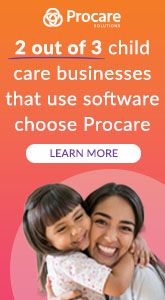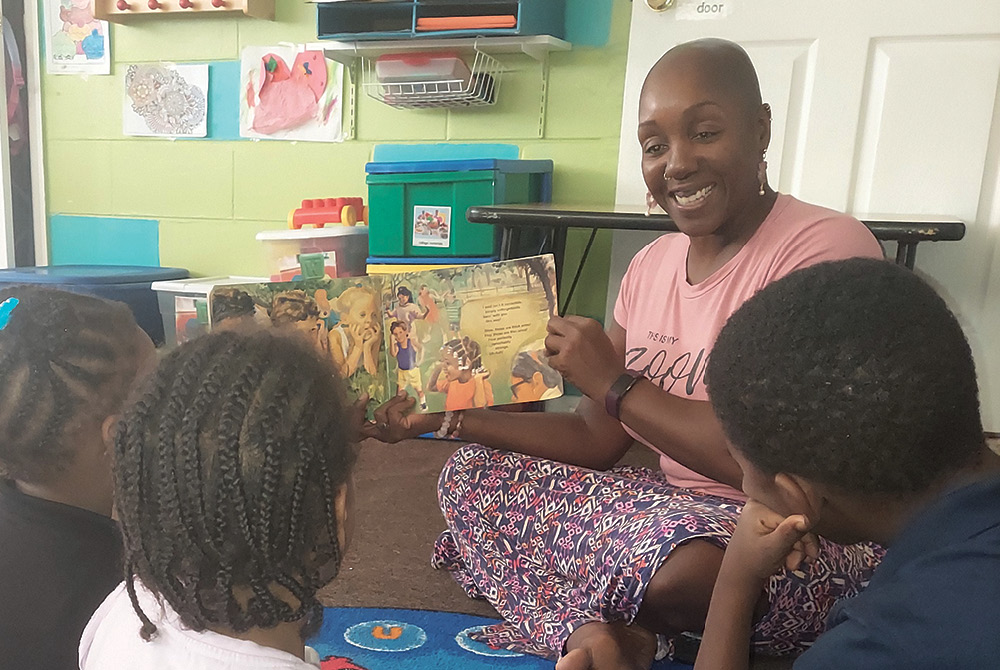It is 6:54 a.m. on Tuesday morning and my cell phone is ringing. My client, an essential worker, tells me that he is on his way to drop off his daughter Hailey at my home child care. I hang up and take a steadying breath. Like every morning since the pandemic began, I wonder to myself if I am doing the right thing by keeping my doors open to the children of essential workers. I am putting my family at great risk. Both my husband and I have underlying conditions, and his 83-year-old mom lives with us. Could I live with myself if one of them contracted COVID-19 because of my decision to stay open? At the same time, could I live with myself if I shut my door on parents and children in need?
The doorbell rings a short time later and I make my way to my front door. We have all gotten the routine down, now. I open the door and move aside to let Hailey in. Her father stands a distance away from the door; he knows not to approach the threshold.
Hailey and I do not hug as we did before the pandemic, but I give her a smile and say good morning. I visually scan her body and listen for a cough as she removes her coat. I do not have access to a thermometer to check her temperature, so I look closely for sweat on her brow. When she is ready, I lead Hailey to the bathroom so that she can wash her hands. As I watch her lather, I feel a tinge of pride. She has learned what areas she needs to reach and how long she has to rub her hands together. I have been caring for Hailey since she was six weeks old. She is almost 4 now, and the time has flown by.
I try to keep our daily routine as much like the old one as possible, but the differences are striking. In the era of COVID-19, I am Hailey’s only playmate. Instead of running around with her, I try my best to keep my distance while she plays. While Hailey naps, I sanitize every surface I can. I am as thorough as possible, fearing the worst if I miss a spot. I wonder when I will be able to find sanitizer at the store again. My cleaning supplies are running low, and the store shelves are empty. I have no idea how I will be able to maintain a clean, healthy, virus-free environment without access to bleach.
By the end of the day, I am mentally and emotionally exhausted, but I do not dare rest until I take a shower and change. As I do so, I continue to think of Hailey. She still seems happy and content to run around the otherwise empty child care. I wonder if she understands any of what is happening. Does she miss her friends? Can she tell that I am afraid?
ADVERTISEMENT
My story has played out in many emergency child care homes and centers throughout our state. Money is not our motivation. Caregivers opened their homes and centers so that families can continue their essential work, without the pressure of worrying about what to do with their children.
What will the post-pandemic world look like for centers and home programs once this lockdown has ended? Rumors are running rampant that we will lose a large portion of our children. How will our programs survive? It is more important than ever for both center and home-based providers to stand together in solidarity.
I feel solidarity with my fellow child care workers right now, because I know that many are facing the same challenges that I am. Day after day, child care workers are overlooked on the news and left out of COVID-19 relief packages. We do not have access to personal protective equipment or sanitization supplies. Child care workers have been given, on average, an extra $10 per day to take care of children during the pandemic. Yet, we put our lives and our families’ lives at risk every day. If child care workers were unable to work, other essential workers would be forced to stop working too.
Like other essential workers, child care workers are in the fight of, and for, our lives. We know that now is the time for us to step forward and do what we do best: take care of children. We need our policymakers to recognize our sacrifice by giving us the recognition, funding and protective equipment we need to do our work.
Patricia Twymon is a happily married mother of three sons, and grandmother to three granddaughters. Her program is a group family child care home with over 25 years of experience. Her style of teaching allowed her to become the 2009 Kohl McCormick Early Childhood Teaching Award recipient. Her program currently holds the ExceleRate Illinois Gold Circle of Quality and accreditation through the National Association for Family Child Care. Twymon is a trainer, mentor, and advocate in the field, and she continues her quest for knowledge by being a life-long learner.
Related
ADVERTISEMENT











